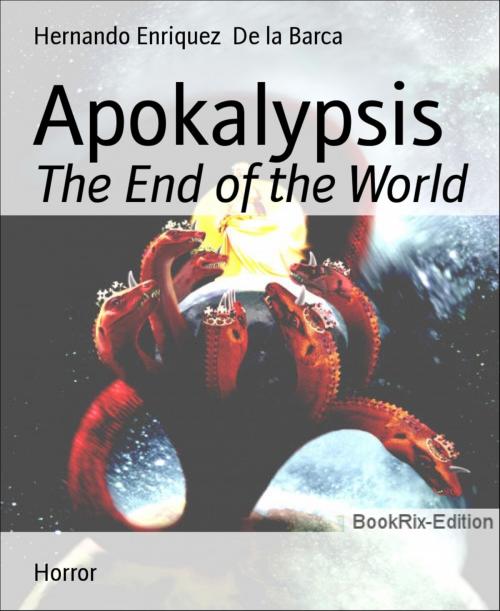| Author: | Hernando Enriquez De la Barca | ISBN: | 9783955005627 |
| Publisher: | BookRix | Publication: | March 30, 2013 |
| Imprint: | Language: | English |
| Author: | Hernando Enriquez De la Barca |
| ISBN: | 9783955005627 |
| Publisher: | BookRix |
| Publication: | March 30, 2013 |
| Imprint: | |
| Language: | English |
The word "apocalipse" comes from the Greek "apokalypse" which means "uncovering" or "revealing future events and things concerning the end of the times according to God." In the context of the book of Revelation, this means: "discover or expose to the light things, future events and conditions concerning the kingdom of God." We will study that such future referred to in this book is based since the year 4,153 (year of God) after the death of Jesus Christ and until the end of the world. You know that there are three eras or ages since the foundation of the world (this time is the time according to the God of the universe, neither according to the Gregorian calendar nor according to the scientists of the Earth): a) The Patriarchal era: Which covers from the beginning of the world until the age of the patriarchs Abraham, Isaac and Jacob (comprising the year 0 when Adam was banished from Paradise until the year 1,666, which is the year of the Great Flood). b) The Mosaic era: from the year after the flood (the year 1667, year of God) to the birth of Jesus the Christ of Nazareth (the year 4,120, year of God). c) The Christian era: from the death of Jesus (the year 4,153, year of God to the present time, which is the year 6,132 since the eviction of Adam from Paradise). Jesus Christ of Nazareth reveals to his apostle John (when John was over ninety years old and was exiled to the island of Patmos) visions, prophecies and messages about the Apocalypse. I want to reiterate the definition of "prophecy" which comes from two Greek words together: "prophanai" "pro" means "before" and "phanai" means "talk" (talking about or communicating events, happenings, visions, predictions, conditions repentance messages and future events inspired by God through an intermediary called prophet, from the Greek "prophetes" which means "one who speaks to God." Note that God exists outside the dimension of time and space. Prophecy was the way of communication between God and man that existed during the time of the Old Testament (the old covenant of God with his people). The modern form of communication of today with God and man is through Jesus the Christ of Nazareth according to the books of the New Testament (It is the new covenant between God and his people). The very first of the prophets was Moses (his name means "the one who is removed or taken out of the water) and the last of the prophets of the Christian Bible was the apostle John (his name means" faithful to God) who wrote the Book of Revelation through visions and dreams on the island of Patmos under the inspiration of God. "Blessed is he that readeth, and they that hear the words of this prophecy, and keep those things which are written therein: for the time is at hand" (Revelation 1:3).
The word "apocalipse" comes from the Greek "apokalypse" which means "uncovering" or "revealing future events and things concerning the end of the times according to God." In the context of the book of Revelation, this means: "discover or expose to the light things, future events and conditions concerning the kingdom of God." We will study that such future referred to in this book is based since the year 4,153 (year of God) after the death of Jesus Christ and until the end of the world. You know that there are three eras or ages since the foundation of the world (this time is the time according to the God of the universe, neither according to the Gregorian calendar nor according to the scientists of the Earth): a) The Patriarchal era: Which covers from the beginning of the world until the age of the patriarchs Abraham, Isaac and Jacob (comprising the year 0 when Adam was banished from Paradise until the year 1,666, which is the year of the Great Flood). b) The Mosaic era: from the year after the flood (the year 1667, year of God) to the birth of Jesus the Christ of Nazareth (the year 4,120, year of God). c) The Christian era: from the death of Jesus (the year 4,153, year of God to the present time, which is the year 6,132 since the eviction of Adam from Paradise). Jesus Christ of Nazareth reveals to his apostle John (when John was over ninety years old and was exiled to the island of Patmos) visions, prophecies and messages about the Apocalypse. I want to reiterate the definition of "prophecy" which comes from two Greek words together: "prophanai" "pro" means "before" and "phanai" means "talk" (talking about or communicating events, happenings, visions, predictions, conditions repentance messages and future events inspired by God through an intermediary called prophet, from the Greek "prophetes" which means "one who speaks to God." Note that God exists outside the dimension of time and space. Prophecy was the way of communication between God and man that existed during the time of the Old Testament (the old covenant of God with his people). The modern form of communication of today with God and man is through Jesus the Christ of Nazareth according to the books of the New Testament (It is the new covenant between God and his people). The very first of the prophets was Moses (his name means "the one who is removed or taken out of the water) and the last of the prophets of the Christian Bible was the apostle John (his name means" faithful to God) who wrote the Book of Revelation through visions and dreams on the island of Patmos under the inspiration of God. "Blessed is he that readeth, and they that hear the words of this prophecy, and keep those things which are written therein: for the time is at hand" (Revelation 1:3).















